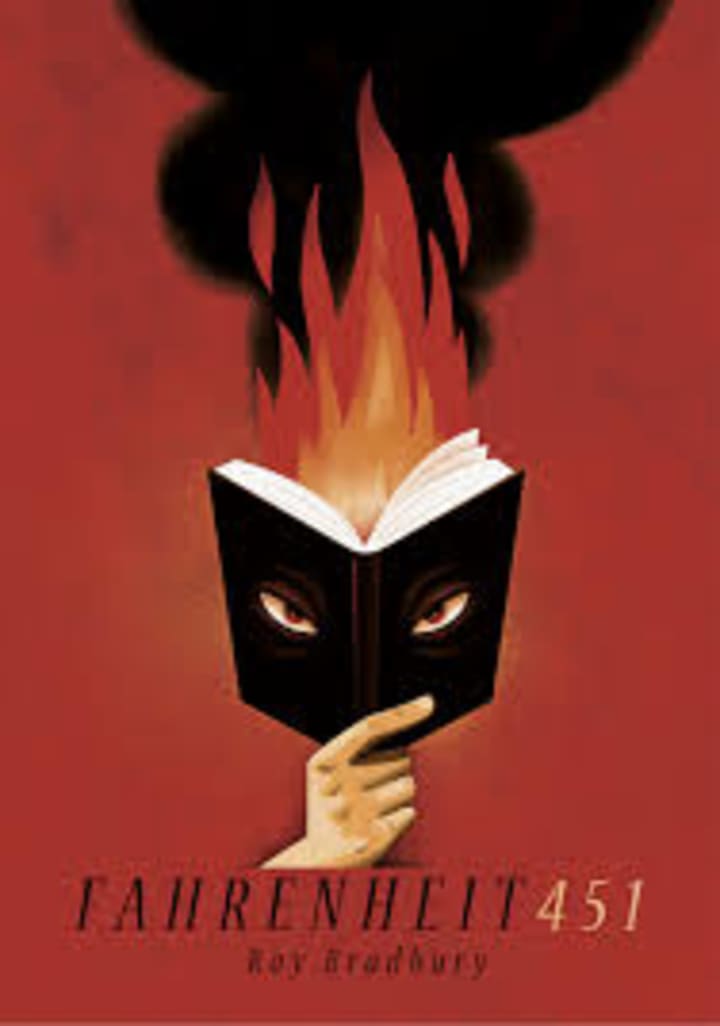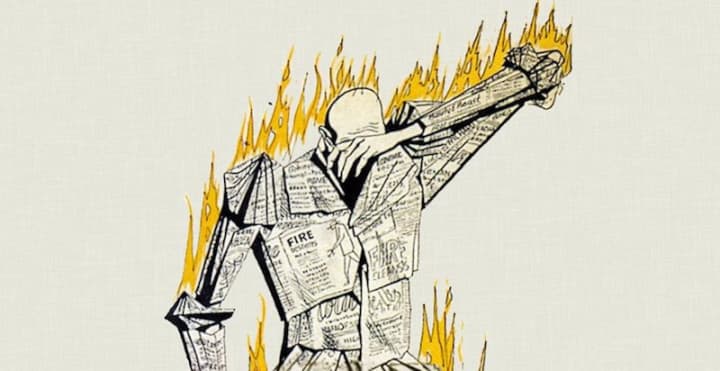
In Fahrenheit 451 (F451), Bradbury is criticizing the mindless pawns that people have become and the censorship that stems from complacency, along with how society as a whole is the reason for these issues. He does so in a riveting story about a society that burns books- and housese and people who have them.
One great expample of this complacency can be found in the following quote; “Why learn anything save pressing buttons, pulling switches, fitting nuts and bolts? (Bradbury #56)” In this part of the novel, Beatty- The fire chief and a ‘friend’ of Guy’s (who is our main character)- is explaining to Guy Montag how the world became what it is and why books are so evil. The people in the novel fall into this stagnant way of life because the government (and society) took away the things that made them different. Because of this suppression of individuality, they turned into cookie-cutter ‘humans’. The more distractions you give the people, the less character they have. I believe this is the point Bradbury tries to make throughout the biggest portion of the novel.
By censoring out knowledge and whole lengths of time in history, the society that exists in Bradbury’s F451 believes it can stop riots and racial disputes, creating a peaceful, mindless mass of individuals. “We can’t have our minorities upset. (Bradbury #59)” Burning a few books? Not a big deal. Leaving out bits and pieces of history? Not too important, anyways. I can't help but draw a similarity to these book burnings int eh book tot he real life book burnings that took place in Germany while Hitler was in power.
While I think that the focus on the book was more on Guy's journey to independent thinking, Bradbury subtly hints at how this censorship of books is a way the government can control what is and is not true. Words are power, something Hitler understood very well, which was why he burnt so many books that had opposing ideals; anything he saw as a threat to his word and his rule was burnt. The book takes a similar approach, but in a much more extreme, as all books are evil - not just some of them.
Bradbury is trying to point out a very important question, “When does it stop?” When does it become too much; when does society sit back and say, Okay, we've gone too far. By censoring, we are deleting history and dumbing down the masses. Even the value of life means little to nothing now, as is shown when the firemen set a house ablaze with it's occupants inside.

When you take away individuality from every citizen, how do you make them feel smart, and important like nothing could happen to them? The book's solution to this was to: “Cram them full of non-combustible data. (Bradbury #61)” By filling their heads with unimportant knowledge, how to pull a switch, or interact with the ‘family.’ By creating this false sense of intelligence, the government can predict and control with ease. The government is even able to create a false sense of security- no, more like immortality- among its citizens. Here again, I can't help but find a parallel between what Bradbury says about useless information and the way young children have access to the internet these days (such as tiktok). And while there's the point that the internet is a hub of information, it is just as much a hub of misinformation and useless 'stuff'.
The entire book can be summed up among the quotes I've included in this article, One of which places importance on self-reliance and learning through mistakes. “If you hide your ignorance, no one will hit you and you’ll never learn. (Bradbury #104)” One of the core problems in society at the time Bradbury would have been writing this was the start of the red scare. Senator McCarthy was condemning political rebels without proof, claiming them to be soviets. This was even used for political agendas, those who did not agree with the government funded artist programs only had to claim their members were communists and suddenly defunding was on the agenda. Everyone bought right into it without question.
This particular piece could be seen as Bradbury’s retort to a flawed system -as if to say; ‘Even if we become mindless sheep, it will not be all of us and it will not last forever.’ Bradbury was quite right in this reguard (if we are to believe that what I've surmised was his true thoughts) as the red scare waned off as the Cold War came to an end. Though people in America still have very negative feelings to communism, it is not something people spend their days fretting over.

Bradbury links all of this chaos with technology in this hypotehtical futuristic setting. “Let the war turn off the families… stand back from the centrifuge. (Bradbury #87)” He warns us of a future full of mindless humans and smart drones (which we currently do have). He points out that censoring and tv are just the beginning of it all (twitter, anyone?). But, he points out that once the ‘centrifuge' begins, it’s better to wait for it to break than to try and intervene, because you’ll just get sucked right back up. Though, getting there in the first place is what Bradbury is trying to warn against.
In conclusion, I feel that what Bradbury was trying to convey in this novel is the importance of keeping your mind sharp. By doing so, you can be aware of censorship and (hopefully, if there's enough of us) protect society from plummeting into an ignorant, stale and highly dangerous dystopia. The reasons that censorship is so dangerous are endless but if we keep going down the path that we are on, we could very well end up in Guy Montag’s world. I think the great question to ask at that point would be whether or not we will be a Guy, Clarice, or Mildred. The choice is inevitably up to the individual.
Bradbury has often had his sociological and philosophical fiction stories come to fruition, and as someone who began reading this when I was 15, and looking back a decade later, I can see how his works have begun to apply to our lives now. Though it is nowhere near Guy Montag's dystopian book hating world, there are many similarities (which I've tried to point out along the way) to his preditions and our world today.
To end this on a lighter note, don’t forget that complacency within yourself is harmful as well. If you’re in the same routine day after day, it might be time to change it up with something as simple as going on a walk or turning the TV off. Because the last thing we want is to not pay attention, and one day wake up to find that we’ve been thrust into a world as the one Bradbury created in Ferenheight 451.

Works Cited
Bradbury, Ray. Fahrenheit 451. New York: The Random House Publishing Group, 1957
About the Creator
QuirkyMin
Aspiring writer, sharing articles of personal interest as well as original short stories.
https://linktr.ee/quirky.min






Comments
There are no comments for this story
Be the first to respond and start the conversation.